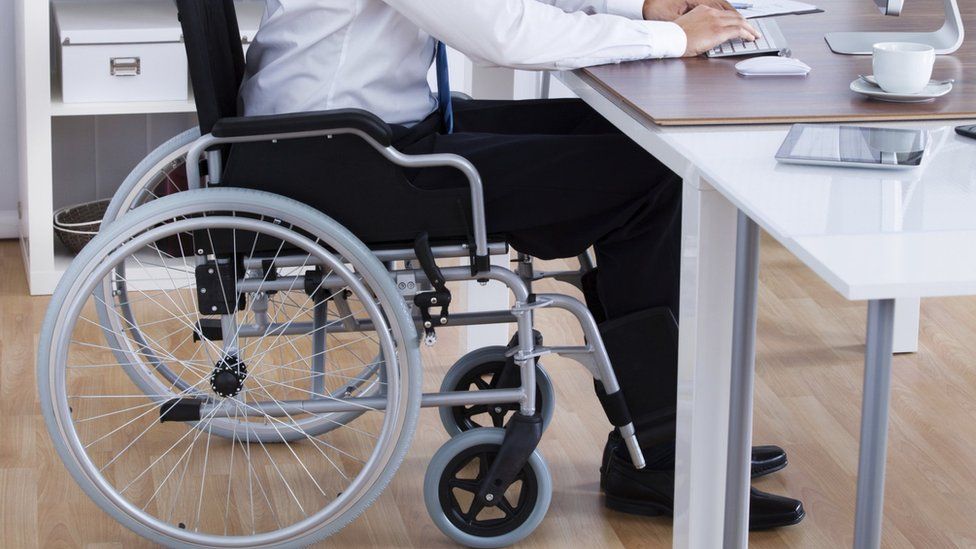Call to end workplace disability discrimination by employers
- Published

Too many people with disabilities are being prevented from working because employers are unwilling to make reasonable adjustments, a charity has said.
Citizens Advice Cymru found people with long-term health conditions had also faced bad practice and discrimination.
In a report, it called for more help and support for people in work.
The UK government said the Access to Work programme could help employers pay for workplace adjustments.
Between 2015 and 2016, Citizens Advice Cymru collected data which showed just 43% of working-age people with a disability or long-term health condition were in employment.
This compared to 79% of non-disabled people, representing an employment gap of 36% compared to a UK-wide figure of 32%.
The organisation's policy officer Lindsey Kearton said lack of workplace support could have a "huge impact" on the mental and physical health of those affected.
She also said some feel they have no choice but to leave their position voluntarily while the cost of employment tribunals meant fewer were pursuing that option.
However, the Federation of Small Businesses diversity chairwoman Helen Walbey said some employers simply did not know how to get help or information, and could be fearful of getting things wrong.
"Small businesses are proportionally better at employing people with disabilities than large businesses - we tend to be more agile, tend to be quite inclusive, perhaps less formal than large businesses," she added.
'Really negative'
She said the Access to Work scheme - which offers practical support for starting and staying in work - was a good provision.
However, Ms Walbey described it as "overly bureaucratic" with not enough businesses knowing they are able to access it.
"It would be really good if the Welsh Government developed a national employability strategy so that it was able to concentrate its efforts so everyone can find out the information they need to best support businesses, community and staff - and get the best of out of everybody," she added.
One person affected is mother-of-two Samantha Broome, 31, from Barry, Vale of Glamorgan, who developed a chronic pain condition last year and is still waiting for a diagnosis from doctors.
She was dismissed by her employer after taking sick leave and, despite attempts to resolve the situation, is now taking them to an employment tribunal on the grounds of discrimination.
"It's massively knocked my confidence," she said. "I've never been out of work or been dismissed from a position, I've never had a disciplinary.
"I feel a lot of employers would think twice about employing someone if they had to make adjustments for them. I feel really negative about the whole situation."
'Improve opportunities'
A spokesman for the Department for Work and Pensions said the number of disabled people in work had increased by almost 600,000 since 2013 and it was "committed to going further".
He pointed to funding available through Access to Work, while employers are being encouraged to sign up to the Disability Confident campaign, where they can make the most of opportunities provided by employing disabled people.
"But more needs to be done, which is why we're consulting on a range of ways to improve opportunities for disabled people," the spokesman added.
A Welsh Government spokesman said it welcomed and supported the conclusions of the Citizens Advice Cymru report.
"Business Wales provides a one-stop shop for business information and advice in Wales with the Skills Gateway the single access point for those seeking skills and employability support," he added.
"Working with the expert Business Wales strategic board, which includes representation from the Federation of Small Businesses, we will be reviewing the guidance available for businesses to help them make their business more inclusive and ensure it is easily accessible."
- Published31 October 2016
- Published4 December 2015
- Published1 November 2016